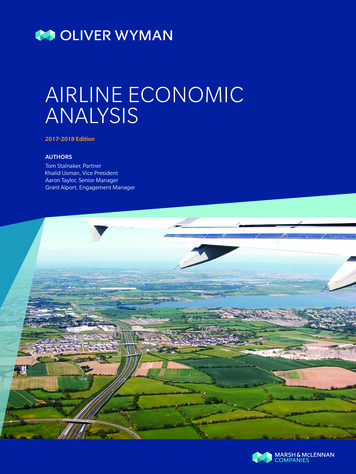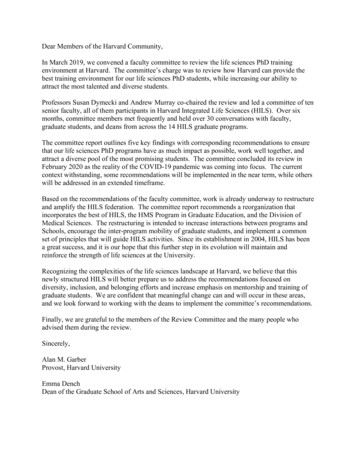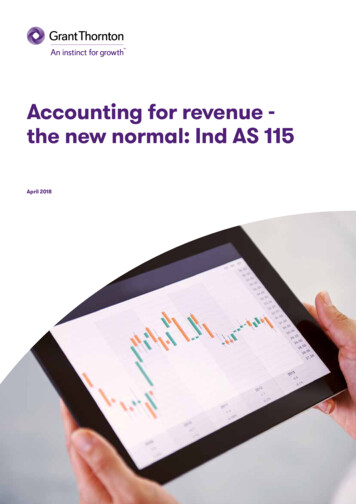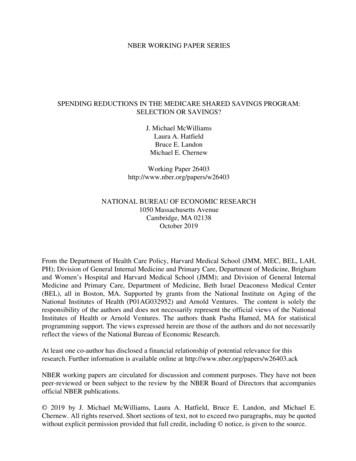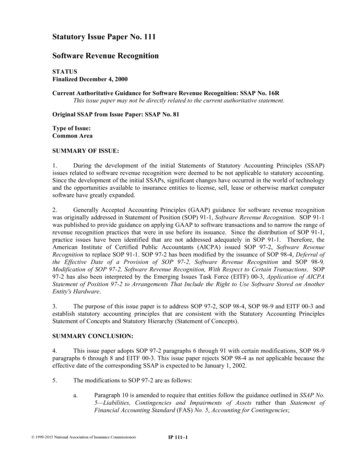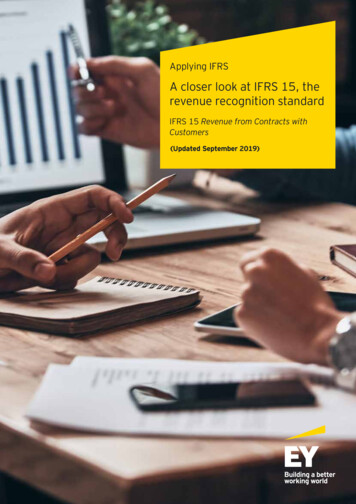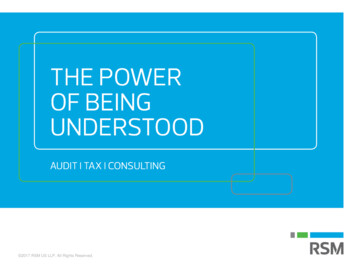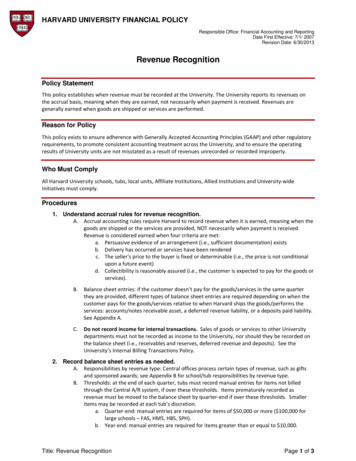
Transcription
HARVARD UNIVERSITY FINANCIAL POLICYResponsible Office: Financial Accounting and ReportingDate First Effective: 7/1/ 2007Revision Date: 6/30/2013Revenue RecognitionPolicy StatementThis policy establishes when revenue must be recorded at the University. The University reports its revenues onthe accrual basis, meaning when they are earned, not necessarily when payment is received. Revenues aregenerally earned when goods are shipped or services are performed.Reason for PolicyThis policy exists to ensure adherence with Generally Accepted Accounting Principles (GAAP) and other regulatoryrequirements, to promote consistent accounting treatment across the University, and to ensure the operatingresults of University units are not misstated as a result of revenues unrecorded or recorded improperly.Who Must ComplyAll Harvard University schools, tubs, local units, Affiliate Institutions, Allied Institutions and University-wideInitiatives must comply.Procedures1. Understand accrual rules for revenue recognition.A. Accrual accounting rules require Harvard to record revenue when it is earned, meaning when thegoods are shipped or the services are provided, NOT necessarily when payment is received.Revenue is considered earned when four criteria are met:a. Persuasive evidence of an arrangement (i.e., sufficient documentation) existsb. Delivery has occurred or services have been renderedc. The seller's price to the buyer is fixed or determinable (i.e., the price is not conditionalupon a future event)d. Collectibility is reasonably assured (i.e., the customer is expected to pay for the goods orservices).B.Balance sheet entries: if the customer doesn’t pay for the goods/services in the same quarterthey are provided, different types of balance sheet entries are required depending on when thecustomer pays for the goods/services relative to when Harvard ships the goods/performs theservices: accounts/notes receivable asset, a deferred revenue liability, or a deposits paid liability.See Appendix A.C.Do not record income for internal transactions. Sales of goods or services to other Universitydepartments must not be recorded as income to the University, nor should they be recorded onthe balance sheet (i.e., receivables and reserves, deferred revenue and deposits). See theUniversity’s Internal Billing Transactions Policy.2. Record balance sheet entries as needed.A. Responsibilities by revenue type: Central offices process certain types of revenue, such as giftsand sponsored awards; see Appendix B for school/tub responsibilities by revenue type.B. Thresholds: at the end of each quarter, tubs must record manual entries for items not billedthrough the Central A/R system, if over these thresholds. Items prematurely recorded asrevenue must be moved to the balance sheet by quarter-end if over these thresholds. Smalleritems may be recorded at each tub’s discretion.a. Quarter-end: manual entries are required for items of 50,000 or more ( 100,000 forlarge schools – FAS, HMS, HBS, SPH).b. Year-end: manual entries are required for items greater than or equal to 10,000.Title: Revenue RecognitionPage 1 of 3
HARVARD UNIVERSITY FINANCIAL POLICYResponsible Office: Financial Accounting and ReportingDate First Effective: 7/1/ 2007Revision Date: 6/30/20133. Apply special accounting rules for certain types of revenue.A. Record revenue offsets for items that reduce revenue, such as scholarships applied to studentincome, rebates, discounts, and adjustments for customer overpayments. Unless a specific objectcode exists to record income offsets, record these offsets in the same coding as initially used torecord the related revenue.B.Pass-throughs: DO NOT record revenue for pass-through expenses and expense reimbursementsor recoveries, record these as credits to the original expense coding. For example: if Harvardpartners with another university to hold a conference and receives reimbursement for some ofthe conference costs (i.e., NOT conference attendance fee revenue), the reimbursement shouldbe credited to the appropriate expense object code or codes, not recorded as revenue.4. Maintain appropriate supporting documentation.A. The tubs must maintain documentation supporting revenue transactions that details the natureof the goods or services provided (or to be provided), such as account coding to credit, the datethe goods or services were (or will be) provided, authorization from the customer ordering thegoods or services, and customer contact information.B.Departments are encouraged to provide a copy of this documentation to the customer, and mustretain the original documentation locally in accordance with the University's document retentionpolicies.5. Review and reconcile balances. All tubs must reconcile and maintain supporting documentation formanually-recorded quarter-end accounts receivable, deferred revenue, and deposit liability balances.Investigate variances and take corrective action on a quarterly basis at minimum. In addition, tubs mustreview manually recorded accounts receivable for collectibility and bad debt reserves.A. Periodically evaluate manually recorded receivables for collectibility throughout the year. Payparticular attention to old outstanding balances; those older than 90 days are generallyconsidered to be past due.B. Record allowances for doubtful accounts and write-offs. If the collectibility of a receivable isdeemed to be uncertain, then the tub must establish a reserve for bad debt. See the Reserves forBad Debts Policy.6. Reverse or reduce entries as needed. The unit that processes a manual accounts receivable,deferred revenue or deposit entry is responsible for reversing the entry (or applying the payment directlyto the receivable) when payment is received, goods/services provided or the agreement period ends.Responsibilities and ContactsFinancial deans or equivalent tub financial officers are responsible for ensuring that local units abide by this policyand the accompanying procedures. The tubs have ultimate responsibility for Central and manual accountsreceivable, student receivables, institutional student loan notes receivable, and mortgage and educational loannotes receivable, as well as all related reserves balances.Financial Accounting and Reporting (FAR), within the Office of the Controller, is responsible for maintaining thispolicy and for answering questions regarding the policy. Contact: (617) 495-8032Central Accounts Receivable Office (Central A/R Office) is responsible for billing receivables through the Oracleaccounts receivable (A/R) system, based on information provided to their office by the tubs. The Central A/R Officecollects outstanding accounts receivable that have been billed through the Oracle A/R system, evaluatesoutstanding receivables for reserves, and identifies receivables requiring write-off. Contact: (617) 495-9497Office for Sponsored Programs (OSP) is responsible for assisting the tubs in determining whether certain revenuesrepresent gifts or awards and for processing cash receipts related to all sponsored awards and non-federal grants.Contact: (617) 496-4771Title: Revenue RecognitionPage 2 of 3
HARVARD UNIVERSITY FINANCIAL POLICYResponsible Office: Financial Accounting and ReportingDate First Effective: 7/1/ 2007Revision Date: 6/30/2013Recording Secretary’s Office (RSO) is responsible for assisting the tubs in determining whether gift revenue maybe recognized and ensuring that it is appropriately recorded. Contact: (617) 495-1750Student Receivables Office (SRO) is responsible for student billing and for processing student payments. Contact:(617) 495-4670Student Loan Office (SLO) is responsible for student loan billing, recording and for processing student loanpayments. Contact: (617) 495-0802Mortgage and Educational Loan Office (MELO) is responsible for billing faculty and staff notes receivable formortgage and educational loans and recording them in the GL, and for collecting payments on these loans.Contact: (617) 495-8858DefinitionsN/ARelated ResourcesInternal Billing Transactions: alBillingPolicy.pdfOffice for Sponsored Programs Program Income Policy: http://vpfweb.harvard.edu/osr/managing/man pos income.shtmlRevision History6/30/2013: Updated format, required material transactions to be recorded on a quarterly basis (instead of annually).AppendicesAppendix A: Revenue Recognition Quick Reference GuideAppendix B: Guide to Revenue Recognition by Revenue TypeAppendix C: Examples of Proper Revenue Recognition AccountingTitle: Revenue RecognitionPage 3 of 3
Revenue Recognition Appendix A - Quick Reference GuideAccounts ReceivableDeferred RevenueNonrefundable DepositsRefundable DepositWhen is itneeded?When Harvard ships goods orperforms services BEFORE thecustomer pays for them,Harvard recognizes the revenueand records an ACCOUNTRECEIVABLE assetWhen the customer pays BEFOREHarvard ships goods or performsservices and Harvard won’t providethe goods/service until the nextquarter, Harvard records aDEFERRED REVENUE liability until itactually ships the goods orperforms the servicesWhen the customer pays anonrefundable deposit ongoods or services BEFOREHarvard provides them,Harvard records a DEFERREDREVENUE liability until itactually ships the goods orperforms the services.When the customer pays arefundable deposit (like a securitydeposit on a lease) that will bereturned to the customer at theend of the lease or otheragreement, Harvard records aDEPOSIT liability until the end ofthe related lease or otheragreement.How do I recordit?Process a journal entry:DEBIT other accounts receivableasset (0130-0299)CREDIT revenue (4000-5899)When do I reversethe original entry?Reverse/reduce the accountreceivable when Harvardreceives the customer payment.Deposit check/cash on a creditvoucher:DEBIT cash 0010*CREDIT deferred revenue liability(2600-2613)Reverse the deferred revenueliability and recognize the revenuewhen Harvard ships goods orperforms services.Deposit check/cash on a creditvoucher:DEBIT cash 0010*CREDIT deposit liability (24802599)Reverse the deposit liability whenthe deposit is returned to thecustomer, generally at the end ofthe lease or other agreement.What is thereversal entry?DEBIT cash 0010*CREDIT accounts receivableasset (0130-0299)Rent, trademark revenues:record as revenue when serviceperformed, reduce receivablewhen customer payment isreceivedDeposit check/cash on a creditvoucher:DEBIT cash 0010*CREDIT deferred revenueliability (2480-2599)Reverse the deferred revenueliability and recognize therevenue when Harvard shipsthe goods or performs theservices.DEBIT deferred revenue liability(2480-2599)CREDIT revenue (4000-5899) Admission deposits: deferuntil students begin classes,then recognize the revenue Advance deposits forevents/functions: defer untilevent/function takes place,then recognize the revenueExamplesDEBIT deferred revenue liability(2600-2613)CREDIT revenue (4000-5899) Subscription revenues paid inadvance: defer based on monthssubscription provided versustotal months in subscriptionperiod, recognize revenuemonthly Advance ticket sales: defer untilevent takes place, then recognizethe revenueDEBIT deposit liability (2480-2599)CREDIT cash 0010*Security or other lease-relateddeposits: record as liability untillease term ends and amount isreturned to customer*Object code 0010 “Cash” is debited on the Central Bank’s balance sheet and a due to/from entry is created crediting object code 0375 “CO Due to/from Tub”on the Central Bank’s balance sheet and debiting object code 0375 on the appropriate tub’s balance sheet.Revenue Recognition – Appendix APage 1 of 1
Appendix B: Guide to Revenue Recognition by Revenue TypeRevenue TypeSchool/Tub ResponsibilitiesStudent incomeSchools/tubs must process journal entries to defer student income until they areearned. Student Financial Services bills students for tuition before each semesterand records tuition revenue for each school. Since SFS records this as revenuebefore the classes are concluded and the revenue is earned, schools must defer aportion of the tuition revenue each quarter until the semester ends. See below fordetailed instruction by student income type.Sponsoredawards/programincomeSchools/tubs do not need to process journal entries to recognize, accrue or defersponsored revenue in the General Ledger. Federal and non-federal sponsoredaward revenues and program income are earned and recognized as the relatedsponsored project expenses are incurred. Revenues for sponsored awards andrelated balance sheet amounts are recorded centrally as part of the month-endclose in the general ledger. Contact the Office for Sponsored Programs for moreinformation.GiftsSchools/tubs do not need to process journal entries to recognize, accrue or defergifts in the General Ledger. Pledges, outright unconditional gifts and unconditionalnon-federal sponsored grants are recognized as revenue immediately upon receiptin the Advance system; information from Advance is entered into the GeneralLedger centrally. See the University’s Pledges and Pledges Receivable Policy and theGift Policy Guide for further information.Student LoansSchools/tubs do not need to process journal entries to recognize or accrue revenuefrom student loan repayments in the General Ledger. The Student Loan Officerecords payments from student loans. However, schools are responsible forproviding SLO with loan fund information to the SLO to establish the receivables.Mortgage andEducational LoansSchools/tubs do not need to process journal entries to recognize or accrue revenuefrom faculty and staff loan repayments in the General Ledger. The Mortgage andEducational Loan Office records payments from faculty and staff loans.Other RevenueBilled ThroughCentral AccountsReceivable (A/R)Schools/tubs do not need to process journal entries to recognize, accrue or deferrevenue billed through Central Accounts Receivable. Central AR automaticallyrecords revenue, receivables, and deferrals throughout the year, regardless ofamount. If a tub receives a payment for an invoice that was billed through CentralA/R, it should send the payment to A/R for processing.Other Revenue NOTBilled ThroughCentral AccountsReceivable (A/R)Schools/tubs MUST process quarterly journal entries to recognize, accrue or deferother revenue items NOT billed through Central Accounts Receivable and thatmeet reporting thresholds. Units that record accruals or deferrals are responsiblefor reversing them timely where necessary.Revenue Recognition – Appendix BPage 1 of 3
Student IncomeTuition and fees are billed and recorded at the beginning of each term. Tubs must defer tuition revenue as describedbelow for any individual program for which the total balance sheet impact at quarter-end is 50,000 or more (i.e., 50K in deferred revenue or accounts receivable).Fall Semester (degreeprogram)Break this semester out evenly across four months – September through December.Under this approach, ¼ (1 month) of the tuition for the semester should be recorded asrevenue in Q1 of each year and ¾ (3 months) in Q2. For the period ended 12/31/XX,the full amount of the fall tuition should be recorded as revenue in the year-to-daterevenues.Spring Semester (degreeprogram)Due to timing, this semester will be broken out using a half-month convention. For themonths of January and May, a half month of revenue should be recognized. ForFebruary through April, a full month should be recognized. Under this approach, 2 ½months of the tuition for the semester should be recorded as revenue in Q3 of eachyear and 1 ½ months in Q4. For the period ended 12/31/XX, NO Spring semestertuition should be recognized as revenue – all spring semester revenue recorded priorto January 1, whether through billing transactions in SIS or cash received from studentsif SIS was not used, should be recorded as deferred tuition revenue.Executive and ContinuingEducationFor any programs exceeding the threshold of 50,000 ( 100,000 for large schools), theprogram revenues should be recorded based on days that the program ran during thegiven quarter. For example, if a program runs for 10 days and 5 of those days fall inQ2, 50% of the total program revenues should be recorded for Q2. The differencebetween the revenue that should be recorded and the payments received fromparticipants should be recorded as deferred tuition revenue.Year roundenrollment(GSAS/doctoralstudents )For instances where the student’s enrollment is year round, the revenue should berecognized evenly over a 12-month period, with three months of revenue in eachquarter.RoomStudent room fees should be recognized as revenue in the same manner as discussedabove for Fall and Spring semesters, or for other forms of room, should be recognizedover the period that the student will be utilizing University housing (similar to theapproach for executive and continuing education).Student Services and/orOther Mandatory FeesThese should be recognized as revenue over the same period of time as the relatedtuition revenue is recognized by combining these fees in with tuition revenue forpurposes of recording necessary deferrals.DiningDining Services recognizes revenue related to board charges on a weekly basis, basedon the annual board rate, the number of annual operating days per dining hall, and thenumber of students “on board” per dining hall. The difference between what has beenrecognized as revenue for the year-to-date and what was received from SIS is recordedas deferred revenue.Revenue Recognition – Appendix BPage 2 of 3
Student Income, continuedStudent Health FeesIntertub TransfersUniversity Health Services recognizes revenue related to student health fees eachmonth based on information from the student term bills. The student health fee isrecognized evenly over a 12 month period, as this fee covers students for the fullcalendar year. Therefore, 1/12 of the fee (1/6 of the fee charged to the students foreach semester), is recorded as revenue monthly, with the difference recorded asdeferred revenue.Schools/Tubs should record intertub transfers over 50K ( 100K for large schools) thatreflect student revenue sharing on a quarterly or semiannual basis through the use of ajournal transfer, which ensures that both units’ GLs reflect the offsetting revenue. NOinternal receivable or payable may be recorded.Other Related AccrualsStudent Financial AidStudent financial aid should be recognized over the same period as the related tuitionrevenue (matching principle). Tubs may use estimation processes to record financialaid costs each quarter that most accurately reflects the matching principle. Theestimation process used will be left to the discretion of the individual tub; however, thetub must be able to back up its approach to recognizing financial aid. To assist in theestimation process, it is recommended that Schools look at historical data, combinedwith budgeted/forecasted financial aid and any other known factors that may impactfinancial aid. For example, if a School knows that the budgeted data is the bestestimate for student financial aid, the budget can be used to assess the percentage offinancial aid as compared to student income. Then, once student revenue isrecognized each quarter in accordance with the instructions stipulated above, theamount of financial aid to be recorded can be calculated and the School will need toensure that this estimated aid figure is what is recorded in the GL for the quarter.Do NOT adjust the sponsored portion of student financial aid. Only non-sponsoredfinancial aid should be adjusted.For student aid transactions that require DFF information, the bulk payroll HUID of99999999 should be used.Schools/Tubs should record intertub transfers that reflect student financial aid sharingon a quarterly or semiannual basis through the use of a journal transfer, which ensuresthat both units’ GLs reflect the offsetting expense. NO internal accruals/deferralsshould be made, meaning any intertub transfers need to be coordinated between bothtubs to agree upon the timing of the transfer.Revenue Recognition – Appendix BPage 3 of 3
Appendix C: Examples of Proper Revenue Recognition AccountingAccounting for Receivables ExampleFAS Core rents space at the Smithsonian Astrophysical Observatory to the Smithsonian Institution. FAS Core manuallybills the Smithsonian Institution 420,000 per quarter in rent. FAS Core is recording the fiscal year 20X1 fourth quarterbilling, for which payment will be received in fiscal year 20X2.Given that this bill is not processed through the Central A/R Office, FAS Core would record a manual journal entry torecognize the revenue and record the receivable at year-end. This entry is presented in the first column. By recording thisaccounts receivable entry, the revenue is appropriately recognized when it is earned in fiscal year 20X1, even thoughpayment is not received until fiscal year 20X2.When payment is received in fiscal year 20X2, the Cash Receipts office would be instructed to credit the payment directly toobject code 0130, “A/R Accruals.” The entry in the second column reflects the cash receipt and offset to the receivable.Fiscal year 20X1Fiscal year 20X2Debit/charge object code 0130:Debit/charge object code 0010*:A/R AccrualsCash (automatically debited when the cashreceipt is deposited)Credit object code 4710:Credit object code 0130:Real Estate Rentals, Nonstudent External,A/R AccrualsGENERALIf the fiscal 20X2 cash receipt were initially credited directly to rental income instead, the following journal entry would benecessary in fiscal year 20X2 to properly offset the receivable and reverse the double-booked revenue.Debit/charge object code 4710:Real Estate Rentals, Nonstudent External,GENERALCredit object code 0130:A/R AccrualsAccounting for Deferred Revenue ExampleThe Business School’s Publishing Corporation (HBSPC) offers subscriptions to the “Harvard Business Review” (HBR). A oneyear basic subscription costs 99. The subscription payments are deposited and recorded as subscription sales income.Because all of the HBR subscriptions are treated collectively as one item that exceeds 5,000, the revenues associated withfuture HBR issues must be deferred at quarter-end. This amount could either be determined by using individual subscriberdata or by estimating a deferral based upon subscription trends. The deferral entry would be updated each quarter basedupon new and lapsed subscriptions as well as monthly subscription issuances (i.e., earning the revenue). Use the entry inthe first column to record the initial deferral or additional deferrals; use the entry in the second column to reduce thedeferral amount.Recording the initial deferral/increasing the deferred revenue amountDebit/charge object code 4670:Subscriptions, External Sales, GENERALCredit object code 2608:Deferred Subscription Revenue, GENERALReducing the deferred revenue amountDebit/charge object code 2608:Deferred Subscription Revenue, GENERALCredit object code 4670:Subscriptions, External Sales, GENERALIdeally, HBSPC would initially deposit each subscription payment to object code 2608, “Deferred Subscription Revenue,GENERAL” instead of subscription revenue upon receipt and thus avoid recording the initial deferral entry in the firstcolumn.*Object code 0010 “Cash” is debited on the Central Bank’s balance sheet and a due to/from entry is created crediting objectcode 0375 “CO Due to/from Tub” on the Central Bank’s balance sheet and debiting object code 0375 on the appropriatetub’s balance sheet.Revenue Recognition - Appendix CPage 1 of 2
Accounting for Refundable Deposit Receipts ExampleHRES receives refundable security deposits from tenants. HRES asks the Cash Receipts office to deposit these amounts assecurity deposit liabilities.Debit/charge object code 0010*:Cash (automatically debited when the cash receipt isdeposited)Credit object code 2481:Security DepositsRefundable deposit receipts must be recorded as a deposit liability upon receipt or no later than quarter-end. If HRES hadinitially credited the receipt to a revenue object code, a journal entry would need to be processed to debit income and creditthe security deposit liability prior to quarter-end.When the security deposit is returned to the customer at the end of the lease term, HRES would charge/debit the paymentto object code 2481, “Security Deposits” in order to reduce the deposit liability.Accounting for Nonrefundable Deposit Receipts ExampleHSPH receives nonrefundable admission deposits in April, May and June from students matriculating in September. Theadmission deposit payments are deposited and recorded as graduate student fee income.The admission deposits must be deferred until the beginning of the 20X1-X2 academic year, when the revenue will beearned. The deferral entry is recorded as of June 30, 20X1 (presented in the first column) and reversed in the first quarter offiscal year 20X2 (presented in the second column). The net effect of the following two entries is to reduce revenue in fiscalyear 20X1 and move it to fiscal year 20X2.Fiscal year 20X1Debit/charge object code 4060:Grad Professional Degree Tuition, GENERALCredit object code 2604:Admission Deposits, GENERALFiscal year 20X2Debit/charge object code 2604:Admission Deposits, GENERALCredit object code 4060:Grad Professional Degree Tuition, GENERALIdeally, HSPH would have initially deposited the admission fees to object code 2604, “Admission Deposits, GENERAL” insteadof graduate student fee income and thus could have avoided recording the entry in the first column.*Object code 0010 “Cash” is debited on the Central Bank’s balance sheet and a due to/from entry is created crediting objectcode 0375 “CO Due to/from Tub” on the Central Bank’s balance sheet and debiting object code 0375 on the appropriatetub’s balance sheet.Revenue Recognition - Appendix CPage 2 of 2
A. Responsibilities by revenue type: Central offices process certain types of revenue, such as gifts and sponsored awards; see Appendix B for school/tub responsibilities by revenue type. B. Thresholds: at the end of each quarter, tubs must record manual entries for items not billed through the Central A/R system, if over these thresholds.

